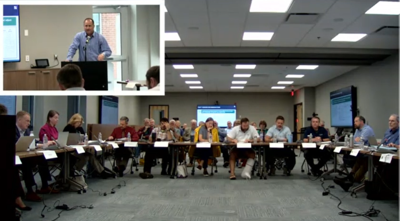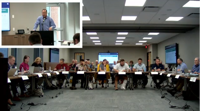GEORGETOWN, Del. — A working group helping shape Sussex County’s next comprehensive plan update is facing growing tension over proposed zoning changes that farmers say could threaten their livelihoods.
The working group is finalizing 19 draft recommendations to send to Sussex County Council. The 10-member group was created at the behest of council to examine land use policies and the challenges of development.
Current recommendations include adjusting the Sussex County Rental Program to encourage more participation, promoting the retention of existing trees, and changing density to allow for more affordable housing.
AR-1 Idea Sparks Debate
Among the most controversial proposals is a potential change to AR-1 zoning, which would limit subdivisions in rural areas to one house per acre. Currently, code permits two units per acre. The intent of the measure is to reduce urban sprawl. However, working group member Jay Baxter, a local farmer, said that proposal will reduce land equity that many farmers rely on to secure credit and sustain operations.
“What this ultimately is going to do is put farm families out of business,” Baxter said. “There are families that are just beginning in agriculture that have relied on their appraisals to get the money they need to invest in their agricultural entity. They are not going to be able to provide more equity to offset that. Some farmers that have been in business for generations and generations are strapped to the point where, when this happens, they will be foreclosed on. That is a fact."
Representatives of the development industry pushed back. Jon Horner, with the Home Builders Association of Delaware, acknowledged farmers’ concerns but pointed to rising land values over the past decade.
“There has been tremendous equity gains due to the development climate here, and the demand for housing in this area,” Horner said, adding that appraisals in rural zones are typically based on agricultural land sales rather than speculative development values.
"That devaluation is not going to happen in those more rural areas that are not pressured by development," he said.
Baxter sharply disagreed.
“With all due respect [...] you’re not factual, and you don’t know what you’re talking about,” Baxter said.
Time constraints highlighted
Other stakeholders echoed the complexity of the issue. Christophe Tulou, representing the Center for the Inland Bays, suggested the group might not be equipped to solve such a multifaceted financial and political challenge in the time remaining before the final meeting, set for Sept. 11.
“We probably don’t have time to figure this one out,” Tulou said. “There needs to be a separate process to really wrestle with the farm equity issues and farmland value — but also the issue of development in places where we really shouldn’t have it.”
Tulou said this issue is paramount for all five members of Sussex County Council. Three past members were unseated amid growing calls for change in how the county handles development. This working group was created by the new council which began in Janury.
The group has been meeting since March.
Density, transportation also discussed
Transportation concerns were also raised. Mark Lutz, chief engineer at the Delaware Department of Transportation, said higher density could work in growth zones — but only with thoughtful design.
"My agency is generally in favor of higher density in the growth areas with a bunch of contingencies,” Lutz said. “If you have four units per acre in a growth area that’s all single-family housing, that hurts the transportation system and puts us even farther behind the eight ball."
The group also discussed Transportation Improvement Districts and the use of fees to discourage growth in conservation areas. The meeting also addressed concerns about requiring developers to preserve 35% to 50% open space in subdivisions, a fee in lieu of mitigation for forest loss, and zoning strategies to support affordable housing and agricultural uses.
September deadline looms
As the group nears its final session, debate remains over how to balance growth, infrastructure, and conservation without upending Sussex County’s agricultural economy.
"This process is not easy," moderator Andrew Bing told the group. "For today, and this is is probably the most unsatisfactory thing I'll say: we're not going to be able to solve all of those problems."
Bing mentioned that once recommendations are finalized and presented to council, there will be apt time for stakeholders to have a large say in how these ideas become actions by Sussex County Council, if at all.
The Sussex County Land Use Reform Working Group next meets September 11.







